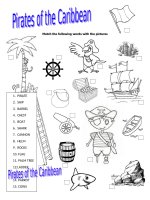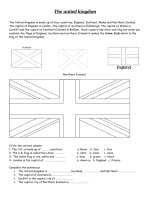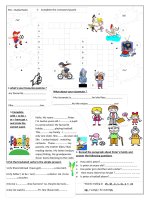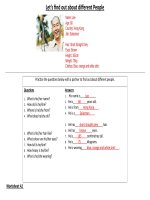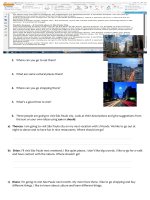islcollective worksheets beginner prea1 elementary a1 adults elementary school high school reading adjectives adverbs ad 10351723145601a647f23f20 80610576
Bạn đang xem bản rút gọn của tài liệu. Xem và tải ngay bản đầy đủ của tài liệu tại đây (2.18 MB, 20 trang )
Back to School
The Basics
Verb-to be
Hi! Hello!
Good morning!
Good afternoon!
Good evening!
Goodbye! Bye!
Goodnight!
Colors
pink
blue
yellow
green
black
brown
white
orange
red
grey
purple
Greetings
School supplies
schoolbag
notebook
book
ruler
atlas
pencil sharpener
pencil
pencil case
pen
How are you?
I’m fine thanks. And
you?
Not bad.
I’m 10 years old
How old are you?
I’m from Russia
What’s your name?
How do you spell it?
What’s your favorite
sport?
School Subjects
Classroom Language
My favorite subject is
English
geography
music
history
maths
computers
science
art
physical education (PE)
drama
1
Read
Listen
Be quiet, please.
Come to the
board, please.
Open your books
Close your books
Sit down please
Stand up, please.
Subject Pronouns
Object Pronouns
I
You
He
She
It
We
You
They
me
you
him
her
it
we
you
they
AFFIRMATIVE
NEGATIVE
QUESTIONS
SHORT ANSWERS
I am
You are
He is
She is
It is
We are
You are
They are
I’m not
You aren’t
He isn’t
She isn’t
It isn’t
We aren’t
You aren’t
They aren’t
Am I?
Are you?
Is he?
Is she?
Is it
Are we?
Are you?
Are they?
Yes, I am. No, I’m not.
Yes, you are. No, you aren’t
Yes, he is. No, he isn’t
Yes, she is. No, she isn’t.
Yes, it is. No, it isn’t.
Yes, we are. No, we aren’t.
Yes, you are. No, you aren’t.
Yes, they are. No, they aren’t
Who
What
When
Where
Why
How
Who are you?
What is your name?
When is your birthday?
Where is your book bag?
Why are you so slow today?
How old are you?
2
COUNTRIES
NATIONALITIES
LANGUAGE
The UK
British
English
The USA
American
English
Poland
Polish
Polish
Turkey
Turkish
Turkish
France
French
French
Russia
Russian
Russian
Italy
Italian
Italian
Portugal
Portuguese
Portuguese
Greece
Greek
Greek
Mexico
Mexican
Spanish
China
Chinese
Chinese
Spain
Spain
Spanish
Japan
Japanese
Japanese
Saudi Arabia
Saudi Arabian
Arabic
3
Cool Stuff
Personal Things
Parts of the Body
Plurals
Have got
My stuff
guitar
helmet
bike/bicycle
basketball
trainers
video/computer
game
skateboard
sunglasses
digital camera
watch
comic book
Describing People
young/old
long/short: hair/nose
tall/short
big/small
thin/fat
Parts of the body
head
nose
ears
eyes
arm
hand
leg
foot/feet
beard
face
teeth
knee
skin
4
this
these
that
those
AFFIRMATIV
E
NEGATIVE
QUESTIONS
SHORT ANSWERS
I have got
I haven’t got
Have I got?
Yes, I have. No, I haven’t.
You have got
You haven’t got
Have you got?
Yes, I have. No, I haven’t.
He has got
He hasn’t got
Has he got?
Yes, he has. No, he hasn’t.
She has got
She hasn’t got
Has she got?
Yes, she has. No, she
hasn’t.
It has got
It hasn’t got
Has it got?
Yes, it has. No, it hasn’t.
We have got
We haven’t got
Have we got?
Yes, we have .No, we
haven’t.
You have got
You haven’t got
Have you got?
Yes, we have. No, we
haven’t.
They have got
They haven’t
got
Have they got?
Yes, they have. No, they
haven’t.
Personal Pronouns
Possessive Adjectives
I
You
He
She
It
We
You
They
my
your
his
her
its
our
your
their
5
Singular Nouns
Plural Nouns
doll
brush
mouse
man
cat
foot
child
tomato
watch
class
lady
cherry
leaf
baby
knife
woman
glass
life
tooth
key
box
tomato
name
scarf
dolls
brushes
mice
men
cats
feet
children
tomatoes
watches
classes
ladies
cherries
leaves
babies
knives
women
glasses
lives
teeth
keys
boxes
tomatoes
names
scarves
6
The Home
There is/There are
a/an
Prepositions of place
Ordinal numbers
bathroom
kitchen
living room
bedroom
hall
door
wall
sofa
floor
stove/cooker
cupboard
mirror
stairs
sink
fireplace
wood
apartment building
block of flats
table
fridge
chair
armchair
carpet
7
cushions (sofa)
closet/wardrobe
bookcase
desk
pillows
vase
flowers
Affirmative
Negative
Questions
Short Answers
There is
There are
There isn’t
There aren’t
Is there?
Are there?
Yes, there is. No, there isn’t.
Yes, there are. NO, there aren’t.
a/an
For 1 thing
Some
Means a few
any
Used for questions and
negatives
For uncountables
A chair
An apple
Prepositions Ordinal Numbers
in
firstswim
I can
on
second
Birds
can fly.
under
third
He can draw pictures.
behind
fourth
next to
in front of fifth
sixth
between
seventh
near
eight
ninth
tenth
eleventh
twelfth
thirteenth
fourteenth
twentieth
twenty-first
Some chairs
Some water/butter/sugar
I haven’t got any French books.
Have you got any money?
CAN’T
He can’t fly.
Babies can’t read.
She can’t drive a car.
8
Families
Describing
people
Daily routines
Present Simple
Jobs
Telling time
Describing People
rude
clever
quiet
ugly
hardworking
polite
happy
funny
strong
weak
noisy
silly
serious
9
Families
granddad
grandma
dad
mum/mom
brother
sister
uncle
aunt
daughter
father-in-law
mother-in-law
husband
wife
cousin/cousin
Daily Routines
get up in the morning
go to school
got to bed
have breakfast
have lunch
have dinner
watch TV
have dinner
in the morning
in the afternoon
in the evening
AFFIRMATIVE
NEGATIVE
Present Simple
We use it for habits of routines.
We use it for things that are
true.
We use it with these words:
always
ever
every day/week/year
usually
frequently
sometimes
QUESTSIONS
SHORT ANSWERS
Do I like?
Do you like?
10
Yes, I do. No, I don’t.
Yes, I do. No, I don’t.
No “s”
I like
You like
I don’t like
You don’t like
He likes
She likes
He doesn’t like
She doesn’t like
Does he like?
Does she like?
It likes
We like
You like
They like
It doesn’t like
We don’t like
You don’t like
They don’t like
Does it like?
Do we like?
Do you like?
Do they like?
Yes, he does. No, he doesn’t.
Yes, she does. No, she
doesn’t.
Yes, it does. No, it doesn’t.
Yes, we do. No, we don’t.
Yes, we do. No, we don’t.
Yes, they do. No, they don’t.
I love swimming.
I hate getting up early.
Adverbs of Frequency
always
usually
often
sometimes
never
frequently
All the time
Most of the time
Quite a lot
Now and then
Not at all
Quite often
Jobs
What do they do?
looks after sick animals
teaches children
fixes cars
types letters, helps her boss
fixes people’s hair/cuts hair
takes care of people in the hospital
takes pictures
plays football
flies planes
vet
teacher
mechanic
secretary
hairdresser
nurse
photographer
footballer
pilot
11
Telling Time: What times is it?
It’s 5 o’clock.
It’s five thirty. 5:30`
It’s quarter past five.
It’s quarter to 6.
It’s 5:15.
It’s 7:45.
At 8 o’clock
Animals
Parts of animals
Prepositions of time
Comparative and Superlative
12
Animals
Parts of Animals
cow
horse
eagle
bear
sheep
fox
chimpanzee
chicken
rabbit
elephant
duck
squirrel
sheep
hamster
giraffe
dolphins
goats
IN
December
in the morning
in the afternoon
in the evening
in summer/winter
in spring/in
autumn
claws
wings
beak
body
legs
head
feathers
tail
fur
hooves
scales
teeth
mouth
horns
AT
ON
at 8 o’clock
at school
at work
at night
at noon/at midnight
at the weekend
on my birthday
on Monday
on Christmas day
on august 8th
13
Adjective
long
wide
big
heavy
beautiful
good
bad
fast
many
long
thin
dangerous
Comparative
Superlative
longer than
wider than
bigger than
heavier than
more beautiful than
better than
worse than
faster than
more than
longer than
thinner than
more dangerous
than
the longest of/in/
the widest of/in
the biggest of/in
the heaviest of/in
the most beautiful of/in
best of/in
the worse of/in
the fastest in/of
the most of/in
the longest in/of
the thinnest in/of
the most dangerous of/in
Weather
Sports Verbs
Present Continuous
Clothes
14
Weather
It’s raining
It’s snowing
It’s foggy
It’s hot.
It’s warm.
It’s freezing
It’s cloudy.
It’s windy.
It’s cold.
SPORTS
AFFIRMATIVE
GO
PLAY
DO
go skiing
go camping
go swimming
go sailing
go windsurfing
go jogging
play computer games
play tennis
play basketball
play ping pong
play handball
play football
do karate
do judo
do exercises
NEGATIVE
QUESTIONS
15
SHORT ANSWERS
I am playing
You are playing
He is playing.
She is playing
It is playing.
We are playing.
You are playing.
They are
applying.
Clothes
I am not playing
You aren’t
playing.
He isn’t playing.
She isn’t playing.
It isn’t playing.
We aren’t
playing.
You aren’t
playing.
They aren’t
playing.
Am I playing?
Are you playing?
Yes, I am. No, I’m not.
Yes, I am. No, I’m not.
Is he playing?
Is she playing?
Is it playing?
Are we playing?
Yes, he is. No, he isn’t.
Yes, she is. No, she isn’t.
Yes, it is. No, it isn’t.
Yes, we are. No, we aren’t.
Are you playing?
Yes, you are. No, you aren’t.
Are they playing?
Yes, they are. No, they
aren’t.
Food
grapes
jacket
butter
tie
chicken
sneakers/trainers
yoghurt
cheese
shirt
oranges
shoes
beef
suit
carrots
socks
lamb
belt
pork
hat
cabbage
gloves
lettuce
shorts
corn
skirt
rice
dress
spaghetti
sandals
apples
flip flops
bananas
a top
potatoes
sweater/jumper
onions
boots
garlic
pants/trouserspasta
soup
jeans
bread
milk
ice cream
cake
pizza
salad
cookies/biscuits
olive oil
sugar
flour
coca-cola
Food
Food containers
Some/any
Will/won’t
16
Affirmative
Negative
Questions
Short answers
I will go
You will go
He will go.
She will go.
It will go.
We will go.
You will go.
I won’t go.
You won’t go.
He won’t go.
She won’t go.
It won’t go.
We won’t go.
You won’t go.
Will I go?
Will you go?
Will he go?
Will she go?
Will it go?
Will we go?
Will you go?
Yes, I will. No, I won’t.
Yes, I will. No, I won’t.
Yes, he will. No, he won’t.
Yes, she will. No, she won’t.
Yes, it will. No, it won’t.
Yes, we will. No, we won’t.
Yes, you will. No, you won’t.
17
They will go.
They won’t go.
Will they go?
Yes, they will. No, they won’t.
PRESENT CONTINUOUS
We use it for now.
We use it with these words:
now
at the moment
right now
today
tonight
AFFIRMATIVE
NEGATIVE
QUESTIONS
SHORT ANSWERS
I am going to leave
I am not going to
leave.
Are we going to
leave?
Yes, I am. No, I am
You are going to
leave.
You are not going to
leave,.
Are you going to
leave?
Yes, I am. No, I am
He is going to
leave.
He is not going to
leave..
Is he going to
leave?
Yes, he is. No, he isn
She is going to
leave.
She is not going to
leave.
Is she going to
leave?
Yes, she is. No, she
It is going to
leave.
It is not going to
leave.
Is it going to leave?
Yes, it is. No, it isn’t
We are going to
leave.
We are not going to
leave.
Are we going to
leave?
Yes, we are. No, we
aren’t
You are going to
leave.
You are not going to
leave.
Are you going to
leave?
Yes, you are. No, you
aren’t.
They are going to
leave.
They are not going to
leave.
Are they going to
leave?
Yes, they are. No, th
aren’t.
Agreeing/Disagreeing
Types of movies
Adjectives for movies
Was/were
18
Past simple Tense
Past simple time words
AGREEING
DISAGREEING
Yes, I do.
So, do I.
Really, I do.
Me neither.
Neither, do I.
Really, I don’t.
Film Adjectives
Types of films
action
horror
animated cartoon
comedy
musical
adventure
romance
detective
western
science fiction
fantasy
boring
interesting
sad
funny
frightening
exciting
Past Simple Tense
Was/were
I was
I wasn’t
Was I?
19
Yes, I was./No, I wasn’t.
You were
He was
She was
It was
We were
You were
They were
You weren’t
He wasn’t
She wasn’t
It wasn’t
We weren’t
You weren’t
They weren’t
Were you?
Was he?
Was she?
Was it?
Were we?
Were you?
Were they?
Yes, you were./No, you weren’t.
Yes, he was. No, he wasn’t.
Yes, she was. No, she wasn’t.
Yes it was. No, it wasn’t.
Yes, we were. No, we weren’t.
Yes. You were. No, you weren’t.
Yes, they were. No, they
weren’t.
Time Words
yesterday (morning)
last week
2 days ago
Past Simple
Regular Verbs
I played
You played
He played
She played
It played
We played
You played
They played
I didn’t play.
You didn’t play
He didn’t play.
She didn’t play.
It didn’t play.
We didn’t play.
You didn’t play.
They didn’t play.
Did I play?
Did you play?
Did he play?
Did she play?
Did it play?
Did we play?
Did you play?
Did they play?
20
Yes, I did. No, I didn’t.
Yes, I did. No, I didn’t.
Yes, he did. No, he didn’t.
Yes, she did. No. she didn’t.
Yes, it did. No, it didn’t.
Yes, we did. No, we didn’t.
Yes, you did. No, you didn’t.
Yes, they did. No, they didn’t.



